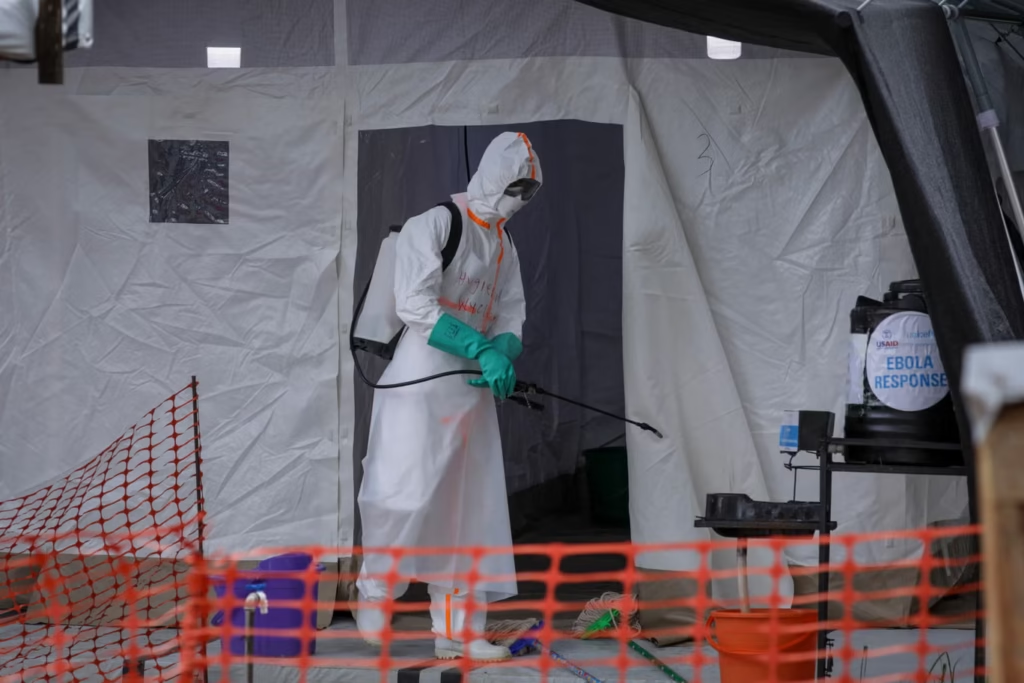Kampala, Uganda – Uganda has reported its second Ebola-related death, a 4-year-old child, sparking fresh concerns about the potential spread of the virus. The outbreak, first declared on January 30, had initially seemed under control, with eight patients successfully treated and discharged earlier in February. However, the latest fatality raises alarm about ongoing transmission risks.
The child, who had been receiving treatment at the main referral hospital in Kampala, passed away on Tuesday. The World Health Organization (WHO) confirmed the death on Saturday, emphasizing the need for increased surveillance and rigorous contact tracing to curb further infections.
Ebola Outbreak in Uganda: Growing Concerns
The first recorded death in this outbreak was a male nurse who had sought treatment at multiple health facilities in Kampala and eastern Uganda before succumbing to the virus. Investigations are ongoing to determine the source of the outbreak, as officials race to prevent further transmissions.
Despite prior optimism from Ugandan health authorities, the new case has reignited fears about the spread of the disease. Uganda’s Ministry of Health has yet to release further details about the child’s case, but officials acknowledge the challenges posed by containing the virus, particularly due to the lack of an approved vaccine for the Sudan strain of Ebola currently affecting the region.
Efforts to Control the Outbreak
Containing Ebola requires swift identification of infected individuals and tracking all potential contacts. WHO reports that more than 20,000 travelers are screened daily at Uganda’s border crossings to prevent cross-border transmission. The organization has committed at least $3 million to assist Uganda’s response efforts. However, there are growing concerns about funding shortfalls following the U.S. administration’s decision to cut 60% of USAID’s foreign aid contracts.
Dithan Kiragga, Executive Director of the Baylor College of Medicine Children’s Foundation, revealed that his organization, which played a key role in supporting Ebola screening, had to halt operations after its USAID contract was terminated. “This decision affected 85 full-time staff involved in critical public health activities,” he said.
Dr. Charles Olaro, Director of Health Services at Uganda’s Ministry of Health, acknowledged the difficulties caused by reduced funding but stressed that Uganda must adjust to the new reality. “There are challenges, but we need to find ways to maintain our response efforts,” Dr. Olaro stated.
Understanding Ebola and Its Impact
Ebola is a highly infectious disease transmitted through direct contact with bodily fluids of an infected person or contaminated materials. It presents as a hemorrhagic fever with symptoms such as fever, vomiting, diarrhea, severe muscle pain, and, in some cases, internal and external bleeding.
The virus is believed to originate from contact with infected animals or the consumption of raw meat from infected wildlife. Uganda has experienced multiple Ebola outbreaks in the past, including a severe outbreak in 2000 that claimed hundreds of lives. The most devastating outbreak occurred in West Africa between 2014 and 2016, killing over 11,000 people.
Ebola in East Africa: A Recurring Threat
Uganda’s latest outbreak follows a broader trend of viral hemorrhagic fever cases in East Africa. Tanzania declared an outbreak of the Ebola-like Marburg virus in January, while Rwanda announced the end of its Marburg outbreak in December. Health experts warn that increased cross-border movement and wildlife-human interactions may heighten the risk of future outbreaks.
Uganda’s previous Ebola outbreak, discovered in September 2022, resulted in 55 deaths before being officially declared over in January 2023. Health authorities are now ramping up response efforts to prevent a similar toll.
Next Steps in Uganda’s Ebola Response
To contain the outbreak, Uganda is focusing on:
- Enhanced Contact Tracing: Rapidly identifying and monitoring individuals exposed to confirmed cases.
- Border Surveillance: Screening travelers at all major crossing points.
- Public Awareness Campaigns: Educating communities on prevention measures, including avoiding contact with infected individuals and seeking early medical intervention.
- International Support: Working with WHO and global health organizations to secure additional funding and technical assistance.
As Uganda grapples with this growing health crisis, experts stress the need for urgent action. Without adequate funding and medical resources, controlling the spread of Ebola will be an uphill battle. The country’s health system is under pressure, and swift interventions are necessary to prevent further loss of life.
For continued updates on this developing story, visit News Xpress Online.

